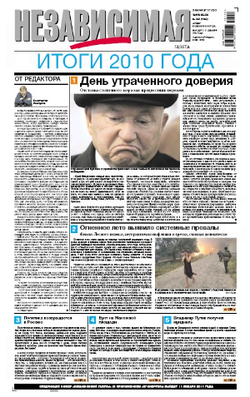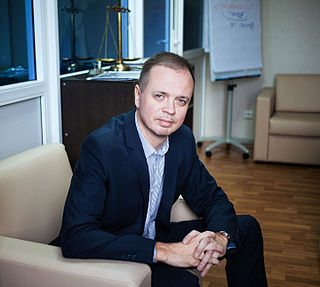Related Research Articles

Russia has consistently been criticized by international organizations and independent domestic media outlets for human rights violations. Some of the most commonly cited violations include deaths in custody, the systemic and widespread use of torture by security forces and prison guards, the existence of hazing rituals within the Russian Army—referred to as dedovshchina —as well as prevalent breaches of children's rights, instances of violence and prejudice against ethnic minorities, and the targeted killings of journalists.

Novaya Gazeta is an independent Russian newspaper. It is known for its critical and investigative coverage of Russian political and social affairs, the horrors of the Chechen wars, corruption among the ruling elite, and increasing authoritarianism in Russia. It was formerly published in Moscow until shortly after the 2022 Russian invasion of Ukraine began, in regions within Russia, and in some foreign countries. The print edition is published on Mondays, Wednesdays, and Fridays; English-language articles on the website are published on a weekly basis in the form of the Russia, Explained newsletter. As of 2023, the newspaper had a daily print circulation of 108,000, and online visits of 613,000.

Vladimir Vladimirovich Kara-Murza is a Russian-British political activist, journalist, author, filmmaker, and former political prisoner. A protégé of murdered Russian dissident Boris Nemtsov, Kara-Murza is vice-chairman of Open Russia, an NGO founded by the exiled Russian businessman and former oligarch Mikhail Khodorkovsky, which promotes civil society and democracy in Russia. He was elected to the Coordinating Council of the Russian Opposition in 2012, and served as deputy leader of the People's Freedom Party from 2015 to 2016. He has directed two documentaries, They Chose Freedom and Nemtsov. As of 2021, he serves as Senior Fellow to the Raoul Wallenberg Centre for Human Rights. He was awarded the Civil Courage Prize in 2018.

Nezavisimaya Gazeta is a Russian daily newspaper.

Anna Stepanovna Politkovskaya was a Russian investigative journalist who reported on political and social events in Russia, in particular, the Second Chechen War (1999–2005).

Dmitry Nikolayevich Kozak is a Russian politician who has served as the Deputy Kremlin Chief of Staff since 24 January 2020. He previously served as the Deputy Prime Minister of Russia from 2008 to 2020. He has the federal state civilian service rank of 1st class Active State Councillor of the Russian Federation.

Yuri Petrovich Shchekochikhin was a Soviet and later Russian investigative journalist, writer, and liberal lawmaker in the Russian parliament. Shchekochikhin wrote and campaigned against the influence of organized crime and corruption. His last non-fiction book, Slaves of the KGB, was about people who worked as KGB informers.
Russian web brigades, also called Russian trolls, Russian bots, Kremlinbots, or Kremlin trolls are state-sponsored anonymous Internet political commentators and trolls linked to the Russian government. Participants report that they are organized into teams and groups of commentators that participate in Russian and international political blogs and Internet forums using sockpuppets, social bots, and large-scale orchestrated trolling and disinformation campaigns to promote pro-Putin and pro-Russian propaganda.

Television, magazines, and newspapers have all been operated by both state-owned and for-profit corporations which depend on advertising, subscription, and other sales-related revenues. Even though the Constitution of Russia guarantees freedom of speech, the press has been plagued by both government censorship and self-censorship.

Dmitry Andreyevich Muratov is a Russian journalist, television presenter and the former editor-in-chief of the Russian newspaper Novaya Gazeta. He was awarded the 2021 Nobel Peace Prize jointly with Maria Ressa for "their efforts to safeguard freedom of expression, which is a precondition for democracy and lasting peace."
Sergei Vladimirovich Kolesnikov is a Russian businessman who has lived in self imposed exile outside Russia since 2010. He is best known as a whistleblower after his December 2010 letter to Dmitry Medvedev, which exposed a corrupt scheme that included the construction of 'Putin's Palace' and challenged the Russian president to fight corruption. After he left Russia, his revelations of large scale corruption in President Putin's inner circle led to investigations in major Western media.

The Russian undesirable organizations law is a law that was signed by President Vladimir Putin on 23 May 2015 as a follow-up to the 2012 Russian foreign agent law and Dima Yakovlev Law. Under the law, Russian prosecutors are able to target foreign groups which they deem to present "a threat to the foundation of the constitutional order of the Russian Federation, the defense capability of the country or the security of the state."

Ivan Yuryevich Pavlov is a Russian advocate and open government activist. He participated in the development of Russian federal and regional freedom of information legislation. He specializes in protecting the right to access government information in Russia, and defending citizens from ungrounded accusations of disclosing state secrets, high treason, and espionage. Additionally, he focuses on raising public awareness of the need for modern legislation on state secrets and the use of current legislation as a means of repression.

Yevgeny Viktorovich Prigozhin was a Russian mercenary leader and oligarch. He led the Wagner Group, a private military company, and was a close confidant of Russian president Vladimir Putin until launching a rebellion in June 2023. Prigozhin was sometimes referred to as "Putin's chef" because he owned restaurants and catering businesses that provided services to the Kremlin. Once a convict in the Soviet Union, Prigozhin controlled a network of influential companies whose operations, according to a 2020 investigation, were "tightly integrated with Russia's Defence Ministry and its intelligence arm, the GRU".
Proekt is an independent Russian media outlet specialising in investigative journalism. In 2021, Proekt was relaunched as Agentstvo, but restored its original name in 2022, while Agentstvo became a news website.

Timur Vadimovich Ivanov is a Russian politician who served as Deputy Defence Minister of Russia from 2016 to 2024. He previously served as the Deputy Governor of the Moscow Oblast from 2012 to 2016. He has the federal state civilian service rank of 1st class Active State Councillor of the Russian Federation. In April 2024, Ivanov was arrested by Russian federal authorities, accused of accepting bribes "on a particularly large scale."
The Russian fake news laws are a group of federal laws prohibiting the dissemination of information considered "unreliable" by Russian authorities, establishing the punishment for such dissemination, and allowing the Federal Service for Supervision of Communications, Information Technology and Mass Media (Roskomnadzor) to extrajudicially block access to online media publishing such information. The most well known of these laws is the Federal Law of 4 March 2022 No.32-FZ enacted during the Russian invasion of Ukraine; the adoption of this law caused the mass exodus of foreign media from Russia and termination of the activity of independent Russian media.
iStories or Important Stories is an independent Russian website specialising in investigative journalism. The website was founded in 2020 by Russian journalists Roman Anin and Olesya Shmagun. IStories published a number of high-profile investigations. The office of the website is located in Latvia.

On Amendments to the Criminal Code of the Russian Federation and Articles 31 and 151 of the Criminal Procedure Code of the Russian Federation is a group of federal laws promulgated by the Russian government during the Russian invasion of Ukraine. These laws establish administrative and criminal punishments for "discrediting" or dissemination of "unreliable information" about the Russian Armed Forces, other Russian state bodies and their operations, and the activity of volunteers aiding the Russian Armed Forces, and for calls to impose sanctions against Russia, Russian organizations and citizens. These laws are an extension of Russian fake news laws and are sometimes referred to as the fakes laws.
Ivan Ivanovich Safronov is a Russian journalist. He was arrested in July 2020 on charges of treason related to allegedly disclosing state secrets. A Kremlin spokesman claimed following the arrest that "As far as we know this is not linked to his prior journalistic activity in any way." Kommersant called the charges of treason "absurd".
References
- ↑ "Main page". team29.org. Retrieved 2016-03-09.
- ↑ "Legal team defends sensitive political cases in Russia". www.aljazeera.com. Retrieved 2016-03-09.
- ↑ "Russian Legal Activists Offer Advice for 'When They Come for You' | News". The Moscow Times. Retrieved 2016-03-09.
- ↑ "Russia drops treason charges against Svetlana Davydova". The Guardian . Reuters. 2015-03-13. ISSN 0261-3077 . Retrieved 2016-03-09.
- ↑ "'The Kremlin gets a monopoly on truth' | A lawyer sets out to challenge Putin's decree classifying Russian military deaths". Meduza. Retrieved 2016-03-09.
- ↑ "Russian 'troll factory' sued for underpayment and labour violations". The Guardian. Agence France-Presse. 2015-06-23. ISSN 0261-3077 . Retrieved 2016-03-09.
- ↑ "Тайна усыновления не устояла в суде". Газета.Ru. Retrieved 2016-03-09.
- ↑ "The Right To Know". guide.team29.org. Retrieved 2016-03-09.
- ↑ ""Команда 29" объявила о самороспуске". Novaya gazeta (in Russian). 18 July 2021.
- ↑ "Генпрокуратура внесла в перечень нежелательных организаций чешскую НПО Spolecnost Svobody Informace". Novaya gazeta (in Russian). 29 June 2021.
- ↑ ""Команда 29" объявила о своем роспуске из-за преследования со стороны властей". The Insider (in Russian). 18 July 2021.